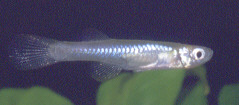Micropanchax pfaffi (Daget 1954)

Male from Burkino Faso.
Photo courtesy of Ed Pürzl.
| Meaning of Name |
After the Swedish Ichthyologist & collector J.R.Pfaff. |
| First Description |
Daget J. 1954. Les Poissons du Niger supéreur. Mémoires de Institut Français d'Afrique Noire (I.F.A.N.) 36: 324-325, figure 124. |
| Size |
Males 30mm, females 35mm (Wildekamp). |
| Meristics |
D = 6-8, A = 11-15, ll = 27-30 (Daget 1954). |
| Karyotype |
|
| Sub-Genus |
|
| Group |
loati. Consisting of - antinorii, bracheti, ehrichi, fulleborni, loati, rudolfianus. |
| Synonyms |
|
|
Populations
|
|
| Type Locality |
125 specimens were collected from various localities in the Upper Niger River basin. The location regarded as a the type locality is a canal at Kokry, southwestern Mali. |
| Distribution |
Widespread in west Africa from Burkina Faso, through Chad & down to Central Africa. |
| Habitat |
Small streams & rivers & shallow areas of larger bodies of water. Sympatric sp. Ep.bifasciatus, Ep.spilargyreius, Poropanchax normani, Script geryi, Fundulopanchax thierryi, Mic.aff.kingii. |
| Distinguishing Characteristics | Distinguished from loati by the rounded (not pointed) shape of the mouth. |
| Colour/Pattern Variability | |
| History |
Collected on May 21st 1927 by J.R.Pfaff. Also collected by Daget 1949 (Southwest Mali), Arnoult 1959 (Burkina), Daget 1963 (Ivory Coast), Roman 1964 (Burkina), Clausen 1966 (northern Cameroon), Paugy et al 1974 & 77 (Ivory Coast) Paugy et al 1975 (Ivory Coast), Wildekamp 1990 (Nigeria & Cameroon border), Wildekamp 1988 (Nigeria). |
| Breeding Notes |
Considered not easy to breed & maintain for successive generations in captivity due to its sensitivity to water pollution. Eggs are attached to top mops & plants. Water incubation 12 - 14 days. Fry on hatching are capable of taking newly hatched brine shrimp. |
| Diameter of Egg | |
| Remarks |
|